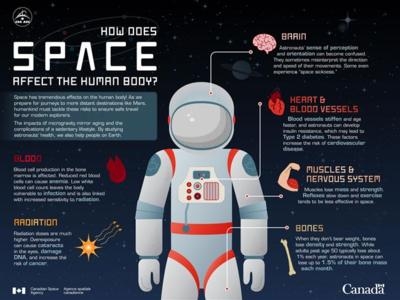Researchers And Companies From Across Canada Advance Science And Technologies On The International Space Station For Healthier Canadians On Earth
Canadian Space Agency (CSA) astronaut David Saint-Jacques, joined by CSA President Sylvain Laporte, have announced the Canadian health experiments to be conducted and the biotechnological devices that will be used during his mission to the International Space Station (ISS).

Dr. Saint-Jacques will wear a biotechnological device that will eventually improve our ability to monitor the health of astronauts. He will also test a new instrument known as a bio-analyzer, which will perform near real-time analysis of blood. Scientists and companies from across Canada were at CSA headquarters to discuss the current and future science and biotechnology experiments in space.
Two new experiments were also announced:
Immuno Profile: This experiment will investigate and monitor astronauts' immune systems over long-duration missions on board the ISS. The results may help us understand how certain diseases evolve over time, such as the reactivation of latent viral infections and age-related decreases in immune defences.
Vascular Aging: Building on previous work in space, this experiment will study the impact of weightlessness, nutrition, physical activity and radiation on the cardiovascular system and the onset of insulin resistance in orbit. This collaborative study will be the first of its kind and will provide insights that will maintain crew health and point to important lifestyle factors that can affect us on Earth.
The Government of Canada is committed to strengthening science in Canada, supporting scientists' vital work and furthering the country's reputation as a global centre of excellence in science, research and innovation.
As part of its commitment to science, the Government of Canada is making sure that space science helps drive innovation in Canada, in alignment with the Innovation and Skills Plan.
As international space agencies explore increasingly distant destinations, space travel must be made safer for astronauts. Canada's space science community makes an essential contribution to understanding issues related to the health and wellbeing of astronauts.
Canadian scientists use space to study our bones, heart, blood vessels and brain. This has led to discoveries that helped develop new fitness strategies to improve the health of people at risk of cardiovascular diseases, increased our understanding of the early stages of Type 2 diabetes and other issues that may arise from increasingly sedentary lifestyles and aging.
"Our government knows that investing in space technology and science aboard the International Space Station will have a direct and positive impact on the everyday lives of all Canadians," said the Honourable Navdeep Bains, Minister of Innovation, Science and Economic Development. "As we look to take on more space-related missions, the health experiments announced today will not only keep our astronauts safer and healthier, but will advance health-related innovations to keep Canadians, on Earth, healthier as well."
(Infographic provided with CSA news release)
 ANN's Daily Aero-Term (05.09.24): Hold Procedure
ANN's Daily Aero-Term (05.09.24): Hold Procedure ANN's Daily Aero-Term (05.06.24): Altitude Readout
ANN's Daily Aero-Term (05.06.24): Altitude Readout ANN's Daily Aero-Linx (05.06.24)
ANN's Daily Aero-Linx (05.06.24) Airborne-NextGen 05.07.24: AI-Piloted F-16, AgEagle, 1st 2 WorldView Sats
Airborne-NextGen 05.07.24: AI-Piloted F-16, AgEagle, 1st 2 WorldView Sats Aero-News: Quote of the Day (05.07.24)
Aero-News: Quote of the Day (05.07.24)



